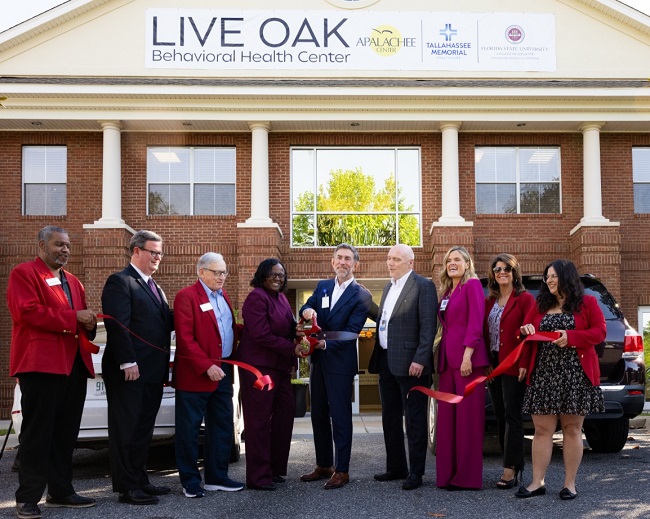Apalachee Center, Inc. and Tallahassee Memorial HealthCare (TMH), regional leaders in behavioral healthcare, are opening a new, innovative facility where patients of both organizations can receive outpatient psychiatry, psychological and psychotherapy services in one central location.
The Live Oak Behavioral Health Center, located at 2600 Centennial Place in Tallahassee, will offer the most comprehensive outpatient mental health services in North Florida, South Georgia and Southeastern Alabama – providing specialized services for adults and children managing acute and moderate mental health disorders, including those accompanied by substance use disorders.
The center’s multidisciplinary team will include psychiatrists, psychiatric nurse practitioners, psychologists, licensed therapists and licensed clinical social workers.
This is a watershed moment for behavioral health services in Tallahassee and the Big Bend,” said Jay Reeve, Ph.D., president and CEO of Apalachee Center. “Apalachee and TMH have worked as close partners for many years, and one of our long-term goals has been to create an integrated behavioral health center where we can provide a wide range of outpatient services in one location by our region’s most seasoned and talented clinicians. The new Live Oak Behavioral Health Center will serve as the central hub for outpatient behavioral health in this region while also housing a new psychiatry residency program. We are excited to see this goal finally become a reality.”
Mental health and substance use disorders were identified as top health priorities for Leon, Gadsden, Jefferson and Wakulla counties through the Community Health Needs Assessment (CHNA) in 2022. As a nonprofit community healthcare system, TMH leads the assessment every three years, working with partners throughout the region to identify barriers to health and implement solutions.
The CHNA calls for expanding prevention and support services for emotional and social wellbeing, increasing skills to assist individuals experiencing mental health or substance use-related crisis and raising public awareness.
The center’s opening will do just that by bringing together TMH, Apalachee Center and Florida State University psychiatrists, psychologists, psychotherapists, psychiatry residents and other trainees in one location and allowing anyone in the community who needs outpatient psychotherapy or psychiatry services to get them in one place.
“If we want to have a healthy community, that includes emotional and psychological care, which are an important part of the healthcare continuum,” said Mark O’Bryant, president and CEO of TMH. “When we began exploring a partnership with Apalachee Center, we quickly realized that our services are complementary. We’ve worked together to create a better strategy for providing behavioral healthcare, whether that’s through the emergency room or outpatient setting, and this in an area where our Community Health Needs Assessment is indicating we should focus our resources.”
Live Oak Behavioral Health Center will also be home to the Florida State University College of Medicine’s Psychiatry Residency Program, which will welcome its first four residents on July 1 and will add four each year until reaching its capacity of 16 residents. This program will provide four years of training in psychiatry for medical school graduates, addressing a critical need for the training of mental health care providers for the region and the state.
“There is a recognized shortage of psychiatrists in the state and a more critical shortage in this area of the state,” said FSU College of Medicine Interim Dean Alma Littles, M.D. “I look forward to the College of Medicine’s contributions to expand access to mental and behavioral health care for patients in the Panhandle and beyond as we train the next generation of psychiatrists.”
Traditional outpatient treatment, partial hospitalization programs (PHP) and intensive outpatient programs (IOP) will be provided at the Live Oak Behavioral Health Center to help clients reduce problematic symptoms, improve their quality of life and help them get back into the community and their routines as they transition out of inpatient care. Specifics about these services can be found below:
- Traditional outpatient treatment: Evaluation, consultation, medication management, and individual and family therapies like cognitive behavioral therapy (CBT), dialectical behavioral therapy (DBT) and eye movement desensitization reprocessing (EMDR).
- Intensive outpatient programs (IOPS): IOPs – which provide treatment three hours per day, three days per week – are designed for individuals with moderate symptoms or in need of a higher level of care than traditional outpatient services.
- Partial hospitalization programs (PHPs): Short-term, group-based, intensive treatment typically lasting two to four weeks designed for individuals with a variety of symptoms. PHPs are designed as a step-down or an alternative to inpatient hospitalization. PHPs provide comprehensive evaluation, treatment and aftercare planning and include medication management, individual, group and family therapies five hours per day, five days a week.

